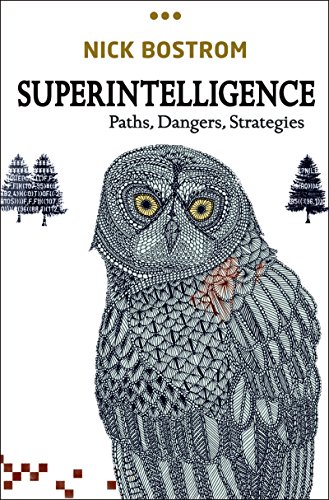6 Superintelligence Books That Define the Future of AI
Bill Gates, Elon Musk, and Nils Nilsson recommend these essential Superintelligence Books to navigate AI's risks and opportunities






What if the next leap in intelligence isn't biological but artificial—and far surpasses human cognition? This isn't science fiction; it's a pressing challenge that thinkers like Nick Bostrom and James Barrat have wrestled with for years. Superintelligence could redefine civilization, and understanding its pathways is crucial now more than ever.
Tech leaders such as Bill Gates, co-founder of Microsoft, and Elon Musk, CEO of SpaceX and Tesla, have publicly emphasized the importance of grappling with AI's future. Gates calls Nick Bostrom's Superintelligence a must-read, while Musk's advocacy for cautious AI development echoes themes explored in James Barrat's Our Final Invention. These voices, alongside scholars like Nils Nilsson and Max Tegmark, ground this conversation in expertise and urgency.
While these expert-curated books provide proven frameworks and rich perspectives on superintelligence, your learning journey can be even more effective when tailored to your background, interests, and goals. Consider creating a personalized Superintelligence book that builds on these insights and addresses your unique needs.
Recommended by Bill Gates
Co-Founder & Former CEO of Microsoft
“I highly recommend this book”
by Nick Bostrom··You?
by Nick Bostrom··You?
During his tenure as founding director of Oxford's Future of Humanity Institute, Nick Bostrom developed a rigorous framework to address what happens when machine intelligence surpasses human capabilities. In this book, you explore the complex challenges and ethical dilemmas posed by the emergence of superintelligent AI, including the AI control problem and potential existential risks. Bostrom breaks down scenarios for how intelligence explosion might unfold and what strategic steps could guide its development safely. If you're grappling with the future impact of AI on humanity or involved in technology policy, this book offers detailed insights into managing this profound transition.
Recommended by Leilani Münter
Environmentalist and Documentary Filmmaker
“@opineno @jrbarrat IMHO “Our Final Invention” is one of the best books ever written on the dangers of AI. I had the pleasure of meeting James for the first time back in 2015, just after I read his book. James is also an accomplished documentary filmmaker.” (from X)
Unlike most books on artificial intelligence that celebrate its promise, James Barrat's work probes the unsettling possibility that AI might surpass and threaten human existence. Drawing on his background as a documentary filmmaker familiar with complex narratives, Barrat profiles tech pioneers and AI systems to reveal the motivations and risks behind the race for human-level intelligence. You’ll explore concepts like the AI control problem and singularity through engaging chapters that balance optimism with caution. This book suits anyone serious about understanding the profound challenges AI poses, especially those interested in ethical and existential implications.
by TailoredRead AI·
This tailored exploration of superintelligence delves deeply into AI risks, ethics, and future pathways, matching your background and interests to provide a focused and immersive learning journey. It examines the complexities of artificial superintelligence, addressing core concerns such as control challenges, ethical dilemmas, and societal impact, while weaving in perspectives shaped by your specific goals. This personalized approach enables you to engage with the subject matter in a way that resonates uniquely with your understanding and ambitions. By tailoring the content, this book reveals pathways through the intricate terrain of AI, offering clarity on emerging opportunities and potential threats in the evolving landscape of superintelligence.
by Darren McKee··You?
Darren McKee’s extensive background as a senior policy advisor and AI analyst shapes this clear-eyed examination of artificial superintelligence and its potential risks. You’ll gain a solid grasp of how AI systems like language models and image generators function, why their rapid advancement poses unique challenges, and the complexities of aligning such powerful technology with human values. The book offers specific insights into societal and policy-level actions to address these threats, making it especially relevant if you want to understand both the technology and the urgent governance questions it raises. This is a thoughtful read if you seek a balanced overview without needing a technical background, though it’s less suited if you want deep technical details or purely optimistic takes.
by Murray Shanahan··You?
by Murray Shanahan··You?
Murray Shanahan, a Professor of Cognitive Robotics at Imperial College London, draws on his expertise to explore what the technological singularity could mean for humanity. Rather than forecasting a fixed future, he examines a spectrum of scenarios where AI reaches and surpasses human intelligence, touching on ethical dilemmas like personhood and responsibility. You'll encounter nuanced discussions about both the potential benefits and risks, such as whether superintelligent machines could enhance human capabilities or pose existential threats. For anyone intrigued by AI's philosophical and practical implications, this book offers a thoughtful, clear-eyed investigation into one of the most debated topics in technology today.
by Pedro Uria-Recio··You?
by Pedro Uria-Recio··You?
After years as a McKinsey consultant and Chief AI Officer, Pedro Uria-Recio developed a broad, insightful view of artificial intelligence that informs this book. You’ll gain a solid grasp of AI’s technical foundations alongside its economic, geopolitical, and cultural implications. Chapters explore AI’s impact on employment, education, and global power dynamics, while also tackling provocative questions like the AI arms race with China and the future of human-cyborg relations. If you want a well-rounded perspective grounded in both history and current trends, this book helps you understand what AI’s evolution means for society at large.
by TailoredRead AI·
This tailored book explores the complex challenges of AI governance and policy in the age of superintelligence. It examines core issues such as risk assessment, regulatory approaches, and societal implications through a lens finely tuned to your background and goals. By focusing on your specific interests, it reveals the nuanced interplay between technological developments and policy strategies that shape AI’s future trajectory. The personalized content synthesizes expert knowledge into an accessible path that helps you grasp difficult concepts and consider practical responses. This approach enables a deeper understanding of how to navigate the evolving governance landscape surrounding superintelligence, making the learning experience both engaging and directly relevant to your needs.
by Uziel Awret, Bryan Appleyard, David Chalmers··You?
by Uziel Awret, Bryan Appleyard, David Chalmers··You?
Drawing from his role as an editor and contributor to the Journal of Consciousness Studies, Uziel Awret brings together a rich dialogue on the technological singularity through this volume. The book compiles a central chapter by philosopher David Chalmers, who explores whether artificial intelligence could genuinely surpass human cognition and the implications if it does. You’ll encounter a spectrum of perspectives from influential thinkers like Daniel Dennett and Nick Bostrom, creating a multifaceted debate on intelligence, consciousness, and future risks. This collection suits you if you want a rigorous philosophical and scientific examination rather than a simplified tech hype narrative.
Get Your Personal Superintelligence Guide Fast ✨
Stop wading through generic advice—receive AI strategies tailored to you in minutes.
Trusted by AI and tech leaders worldwide
Conclusion
This collection highlights three clear themes: first, the ethical and existential risks of superintelligence demand serious scrutiny; second, the governance and policy landscape must evolve rapidly to keep pace with AI’s capabilities; third, the philosophical and societal implications challenge our understanding of intelligence and humanity itself.
If you're grappling with AI safety and future risks, start with Superintelligence and Our Final Invention to grasp foundational concerns. For those interested in policy and governance, Uncontrollable offers timely insights. Meanwhile, The Technological Singularity and The Singularity invite deeper reflection on AI consciousness and human identity. Combining these with Machines of Tomorrow gives a rounded view of AI’s societal effects.
Alternatively, you can create a personalized Superintelligence book to bridge the gap between general principles and your specific situation. These books can help you accelerate your understanding and confidence in navigating the future shaped by artificial intelligence.
Frequently Asked Questions
I'm overwhelmed by choice – which book should I start with?
Start with Superintelligence by Nick Bostrom. It offers a clear foundation on AI risks and strategies, setting the stage for deeper exploration.
Are these books too advanced for someone new to Superintelligence?
Not at all. While some delve into complex ideas, books like Our Final Invention and Uncontrollable explain concepts accessibly for newcomers.
What's the best order to read these books?
Begin with Superintelligence and Our Final Invention for core concepts, then explore Uncontrollable and Machines of Tomorrow for policy and societal context, finishing with philosophical works like The Technological Singularity.
Do I really need to read all of these, or can I just pick one?
You can pick based on your interest—risk, policy, or philosophy. Each provides valuable insights but reading multiple offers a fuller picture.
Which books focus more on theory vs. practical application?
Superintelligence and The Technological Singularity lean toward theory, while Uncontrollable and Machines of Tomorrow emphasize practical governance and societal impacts.
How can I get insights tailored to my specific interests in Superintelligence?
These expert books are invaluable, but personalized content can connect their wisdom to your goals. You might create a personalized Superintelligence book for focused, relevant guidance.
📚 Love this book list?
Help fellow book lovers discover great books, share this curated list with others!
Related Articles You May Like
Explore more curated book recommendations





